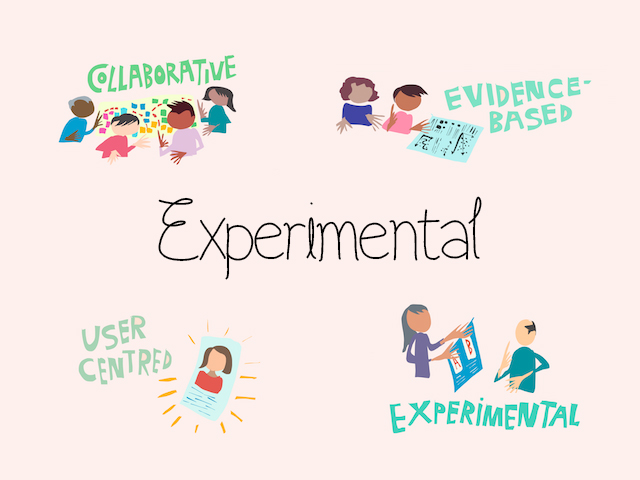Shift to Being Experimental
A2JBC encourages a culture shift in the justice system towards user-focussed, collaborative, and experimental projects and initiatives, which are based on evidence. We call this the A2JBC Approach.
It means a shift in the justice system that creates the right conditions for innovation and experimentation.
Being Experimental
Being experimental means being curious. It means asking questions:
- What is happening?
- What does that mean to our assumptions about what works?
- What do we do because of what we have learned?
The nature of being experimental is that you do not know the answer when you start. You can and should form a hypothesis which is your best guess at what might work, but you have to hold it loosely, and be ready to discard it if the evidence emerging from the experiment proves it wrong. To be experimental you need to measure results. Often you learn the most from the results of failed experiments.
Is Being Experimental Hard?
For the justice sector to accept that we don’t know the answers is counter-intuitive. Yet, as the Roadmap for Change points out that there have been many reports and reform initiatives, “but the concrete results have been extremely modest”.
We need action to address the implementation gap, and that requires acting before we are completely sure of the right action. We have to try things out. We have to experiment.
Being experimental involves risking failure. For lots of good reasons, the justice system is trained to be - and talented at being - risk averse. Therefore, for our system to be experimental, we need to create conditions for failing safely.
In an experiment you need to measure results and the justice system does not have a lot of practice in doing that. That is why A2JBC advocates for a cross-sector approach to measurement and works to find practical ways for organizations to measure outcomes.
Experimental Stories
Shifting to Meet Users’ Needs – A New COVID-19 Expedited Process at the BCHRT
A few days after the COVID-19 pandemic started, the team at the BC Human Rights Tribunal created an emergency response process for COVID-19 human rights complaints.
Read MoreYouth Voices Initiative gets children’s voices heard
BC Family Justice Innovation Lab has developed a platform where young people can share their stories.
Read MoreHelping Families – FMEP Goes Online
The Family Maintenance Enforcement Program (FMEP) is using modern technology to make the system easier to use.
Read MoreThe Access to Justice BC Wolf Factor
We think that A2JBC’s “wolf factor” is that we are aligning justice system stakeholders around a new approach to changing the justice system – an approach that requires a shift in justice system culture.
Read More
A2J Stories
Supporting Organizations

